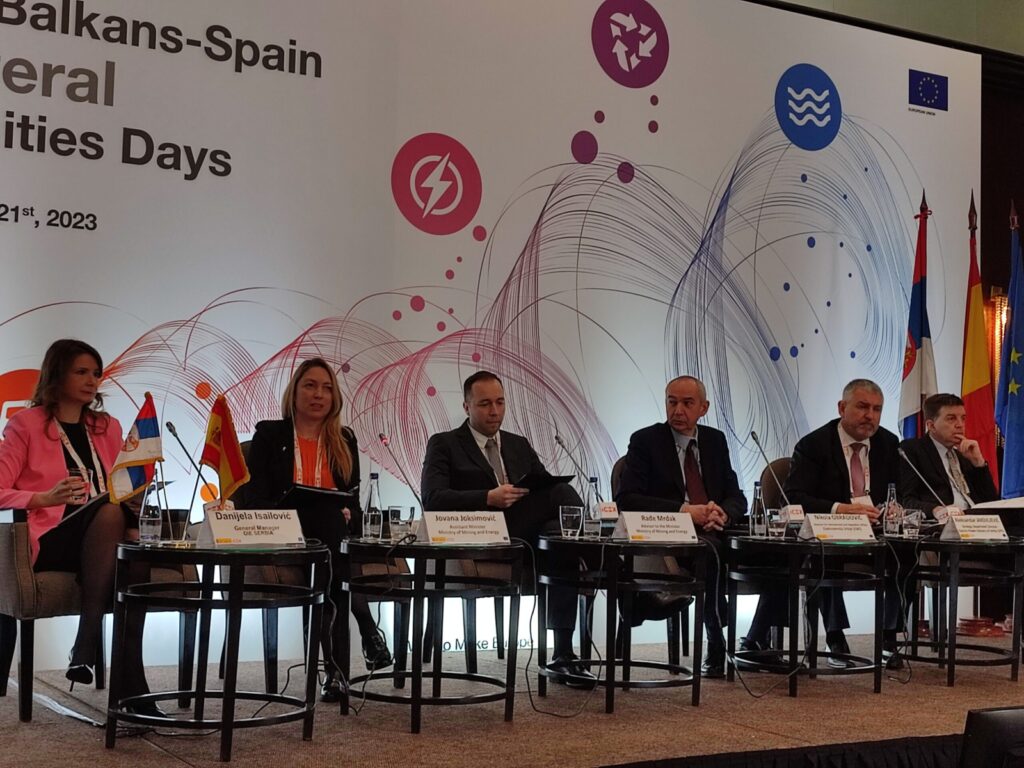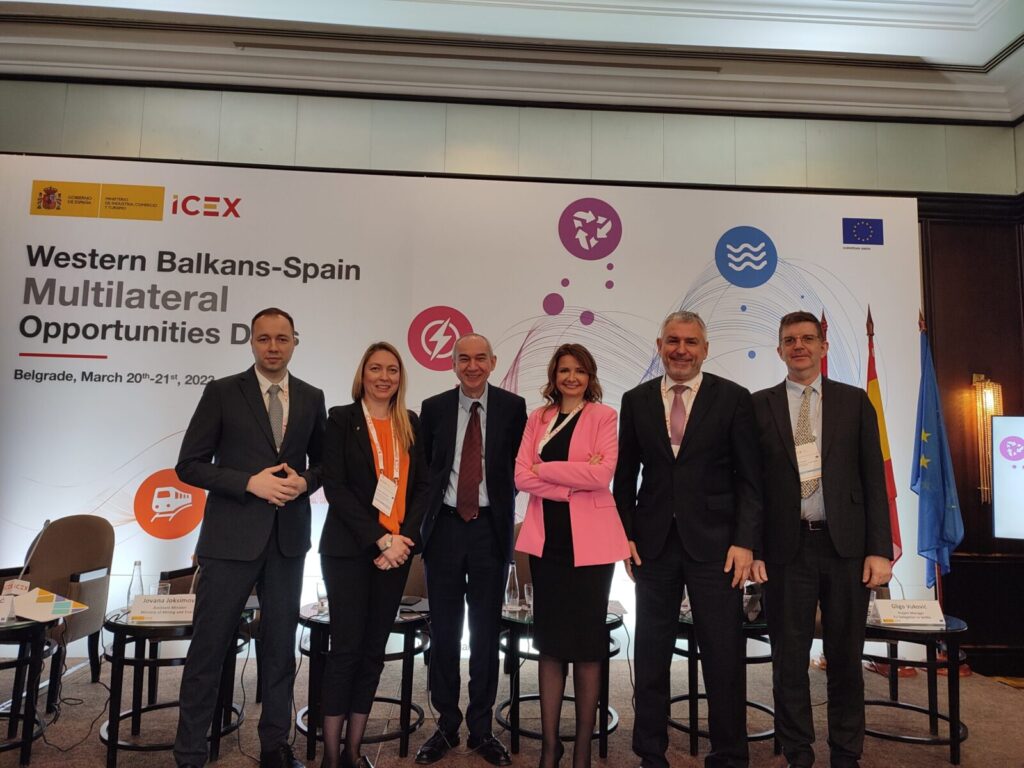Manager of the Association RES Serbia, Danijela Isailović, moderated the first panel on the second day of the “Western Balkans-Spain, Days of Multilateral Opportunities” business forum, organized by the Spanish Agency for Exports and Investments (ICEX) and the Trade Department of the Embassy of the Kingdom of Spain in Belgrade.
Participants in the panel discussion “Business opportunities in the energy sector in Serbia” were Jovana Joksimović (assistant to the minister, Ministry of Mining and Energy of the Republic of Serbia), Rade Mrdak (advisor to the minister, Ministry of Mining and Energy of the Republic of Serbia), Nikola Obradović (director for international and regulatory affairs, AD EMS), Aleksandar Jakovljević (strategy director, PE EPS) and Gligo Vuković (project manager, EU Delegation in Serbia).

“Regarding the cooperation with Spain, after the signing of a very important agreement, we have received a framework in which we can expect the continuation and improvement of cooperation in terms of the preparation of technical documentation and the implementation of certain projects. Ministry of Mining and Energy is open to communication and suggestions. In the process of energy transition, the most important thing is that the transition is fair and sustainable, that it does not threaten supply and energy stability, and that the process itself is implemented as well as possible.” said Jovana Joksimović.
Rade Mrdak referred to the adoption of amendments to the Law on the Use of Renewable Energy Sources and stated that it is necessary to maintain focus on 4 areas: auctions, balancing, connection of variable renewable energy sources and the issue of capacity of prosumers. As far as balancing is concerned, a change has been made that commercial projects must now commercially resolve the issue of balancing responsibility, this means that those who win the auctions will enjoy a regulated regime and will be in the balancing group of the guaranteed supplier. When it comes to the connection of variable renewable energy sources, given that we are facing a large number of requests for connection, a protective mechanism is provided for the TSO. If the TSO determines that there is not enough reserve for balancing, the connection delay measure is applied, with the fact that investors will have the opportunity to exit this regime if they provide additional capacity for balancing. It is necessary that this additional capacity amounts to 20% of the power plant, and investors can provide it themselves or through another market participant. With this measure, it is extremely important to emphasize that all those to whom the TSO have assumed some obligations are exempt from it. According to the estimate of the Ministry of Mining and Energy, it is somewhere around 5 GW of projects, which is also an extremely large number of projects, these are all those projects that have concluded the Agreement on the preparation of the connection study and those are the ones to which the TSO has issued conditions for connection.

Nikola Obradović emphasized that the EMS is sure that by adopting the amendments to the Law on the Use of Renewable Energy Sources, the deficiencies that primarily related to the non-compliance of the old version of the Law with European practice and European regulations related to balancing and priority access have been eliminated. Now all these provisions have been harmonized with the “Clean Energy” package of the European Commission, and in this way we should succeed in accepting the largest possible number of renewable energy sources on the grid, while at the same time maintaining the stable and safe operation of the electrical energy system of Serbia and secure supply to all consumers and industry.
In connection with the document called the “Green Path of the EPS”, where it is stated that the PE EPS will increase its production capacity from renewable energy sources from 3,000 MW to 7,000 MW by 2035, Aleksandar Jakovljević stated that the EPS is waiting the republic’s strategic documents in order to predefine their plans based on them, while a whole series of projects that should ensure a significant increase in the capacity of renewable energy sources has already been defined. It concerns the development of certain hydroelectric power plants not only in Serbia but also in the region, as well as EPS projects from the wind and solar sectors. “When it comes to the Kostolac wind farm, contracts have been signed, activities on the ground have started, according to the current observations and the obligations that have been undertaken, it is expected that this project could be completed at the end of 2024.” added Aleksandar Jakovljević.

Gligo Vuković presented his suggestion regarding potential Spanish contractors and investors, and in connection with projects that require planning and construction. As one of the biggest problems, the licenses of foreign companies proved to be in practice. The legal framework in the Republic of Serbia requires that the company that plans and constructs the projects must be licensed (the so-called “Big License”), but the constructors themselves must have their own licenses. Very often there is a situation where a company that did not meet this condition wins the tender. There are several ways to solve this problem, and the best way is for the company participating in the tender to open its representative office in the Republic of Serbia in advance, to have a permanent lineup of people who are licensed and that the company is licensed. The second way exists as an ad hoc alternative to the first, which is for a foreign company to enter into a consortium with a local company that already owns a license. The third way can be the opening of a representative office in Serbia of a foreign company that has already won the tender, but this is usually the worst option because this approach requires a period of time of at least 6 months, which causes a later delay of the project. According to Gligo Vuković, this is something that all potential foreign contractors and investors must take into account, and that if they want to enter the Serbian market more seriously, the best way is always the first way.
Danijela Isailović concluded the panel discussion by stating that Serbia is an exceptional place and country for investing and that regardless of the workload of the operational, transmission and distribution system of electricity, there is room for good, proven and solvent investors such as the Spanish, and that investors from Spain are always welcome in Serbia.



